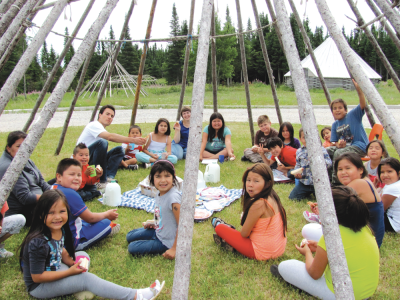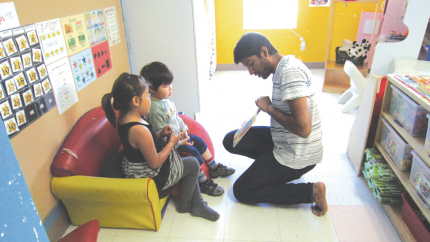 Over the course of four weeks last summer 418 children took part in literacy camps run by Frontier College and the Cree School Board. As a result, 418 kids went back to class in September with stronger literacy skills. Programs in all nine Cree communities combined reading with language and learning games, cultural activities and a great deal of physical activity.
Over the course of four weeks last summer 418 children took part in literacy camps run by Frontier College and the Cree School Board. As a result, 418 kids went back to class in September with stronger literacy skills. Programs in all nine Cree communities combined reading with language and learning games, cultural activities and a great deal of physical activity.
According to Frontier College spokesperson and program head Mélanie Valcin, the main goal of the camps was to prevent summer reading loss. The college’s final report demonstrates the programs more than succeeded. Recently tabulated results show that children in the summer program didn’t just read the required reading amount – they surpassed it significantly.
Valcin pointed to research that indicated that children should read about five books over the summer months to maintain their comprehension skills. Those who participated in the Frontier College programs read an average of nine books over the month-long exercise.
“Often children will finish a school year with one reading level but if they don’t read or write at all over the summer they will return in September having lost the learning equivalent of one full school year,” said Valcin. “We were trying to reduce the incidence of that by offering very rich and fun programming over the summer that includes reading and writing as well as other programming that is conducive to learning.”
 Each child participated in 15 cultural activities, 26 literacy activities and 65 physical activities, filling the days with learning and fun.
Each child participated in 15 cultural activities, 26 literacy activities and 65 physical activities, filling the days with learning and fun.
According to CSB Director of Schools Kim Quinn, Frontier was chosen for this project because of the college’s experience with Aboriginal communities. Frontier College was founded in 1899 and has worked with Aboriginal communities for the last 40 years.
“I heard only positive remarks from our campers, parents and counselors who participated, which says this first camp was a success,” said Quinn. “We are looking at it again for the summer of 2014 with slight improvements, mainly with the intention of welcoming more students.”
Quinn said the Cree School Board had been interested in establishing summer reading camps after a 2008 resolution to this effect by the Council of the Commissioner. The goal is to help students read to their grade level in both their first and second languages.
 “This camp was partly to pursue this end and also to develop a love of reading for our students. Success in literacy is a shared goal among all in the Cree School Board: the council of commissioners, management and schools,” said Quinn.
“This camp was partly to pursue this end and also to develop a love of reading for our students. Success in literacy is a shared goal among all in the Cree School Board: the council of commissioners, management and schools,” said Quinn.
The curriculum for the Cree communities was developed after Ontario’s then Lieutenant-Governor James Bartleman re quested in 2005 that the camp program be founded for Native children in Northern Ontario.
“At the time, we were working in five different communities in Northern Ontario and the success of it was just amazing as the kids loved it, the community loved it, the families loved it and the counselors loved it. So, from the original five communities we have expanded the program to 84 communities across Canada,” said Valcin.
According to Valcin’s report, every parent said their child was more prepared for school as a result of attending camp – and that they would have their child participate in the camp again.
One Waskaganish mother’s letter to Frontier said she was “happy that my daughter was selected to participated in the literacy camp knowing that the community rarely has had these kinds of summer camps in the past. Every morning my daughter was always eager to attend the camp and said that it was always fun at the end of the day. For example, she has shared with us new songs that she learned from the camp. I would have to say that her learning skills improved a lot.”
A Waskaganish grandparent said the camps even benefitted children who were too young to attend. “My grand-girls Chenille and Elisha were reading the books that they brought home. They were reading to their baby sister. It will help them in their education.”
 The camps also created a small youth employment boom as 18 local staff hired to help run the program. An additional 20 staff were hired from the south.
The camps also created a small youth employment boom as 18 local staff hired to help run the program. An additional 20 staff were hired from the south.
According to Concordia Creative Writing student Jade Adams, who worked in Oujé-Bougoumou, the counselors adapted the program to the needs of each group as Oujé only had a class of about 30 kids participating, ranging in age from 6-12.
“We did a lot of drawing comic books and so for the younger children this would mean drawing and then we would help them with a few words and the older kids we would encourage them to do more than one page, to set up where the story was taking place and come up with a title,” said Adams.
Over in Mistissini, Amanda Quinn said that it took a while for the kids in her group to get used to the program as many of them initially confused the counselors with teachers. Through structuring the classroom differently, a little redecorating and using different kids of learning games, Quinn said that they were able to give these children a different kind of a learning experience over the summer.
“Towards the end of the camp they started taking out more books because they were really comfortable, they knew that they could touch them and that they were there for them. Before some of the literacy games in the beginning they were too intimidated to touch these books,” said Quinn.

